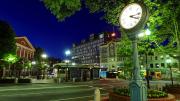Yesterday, Campus Services sent an internal email to staff with news of how the unit is helping students—and the community at large—during these challenging times.
Students who test positive for COVID-19 are being housed in isolation at the Harvard Square Hotel, wrote vice president of campus services Meredith Weenick. “In the early days, we worked with the Harvard Square Hotel management and set up a partnership with the Cambridge Health Alliance to house medical workers and others who did not want to go home to expose their families,” she said. “That was a successful partnership.” It prompted the University’s turn to the hotel for suitable isolation housing for infected students: it has the appropriate 1 bed:1 bath ratio that the Centers for Disease Control recommends, and rooms on each side of the corridor, which makes it easy to provide means and other services for students. “Five percent of the College population can be housed at the hotel,” Weenick explained. “The University has a plan in place in case there is a major outbreak,” she added. “We know which buildings we would use next, if need be.” (As the University COVID-19 dashboard indicates, infection control—based on community-wide social-distancing and masking, frequent testing of those in residence or working on campus, plus tracing and other measures—has been overwhelmingly successful, with relatively few cases to date.)
In addition, Weenick reported, Timnit Abraha, associate director of commercial leasing for Harvard Real Estate (HRE), together with the Harvard Office of the General Counsel and many others, has worked with more than 40 local businesses on ways to adjust lease obligations. “We’ve done everything from temporary rent relief to percentage-of-sale rent agreements,” Weenick said. “As we look to the winter, we will continue to have an open dialogue with our tenants. We’ve given several million dollars in rent deferral across these businesses—we have a shared interest in our tenants’ success, and they are grateful for that.” HRE creative assistance has included helping Vietnamese restaurant Bon Me, located in the Smith Campus Center, establish an outdoor kiosk so those who are not allowed to enter the SCC can still place orders.
“We should acknowledge that this is not just a 2020 problem, but something that will last well into 2021,” Weenick pointed out, indicating a continued commitment to help commercial tenants during a sustained, severely challenging business environment.









